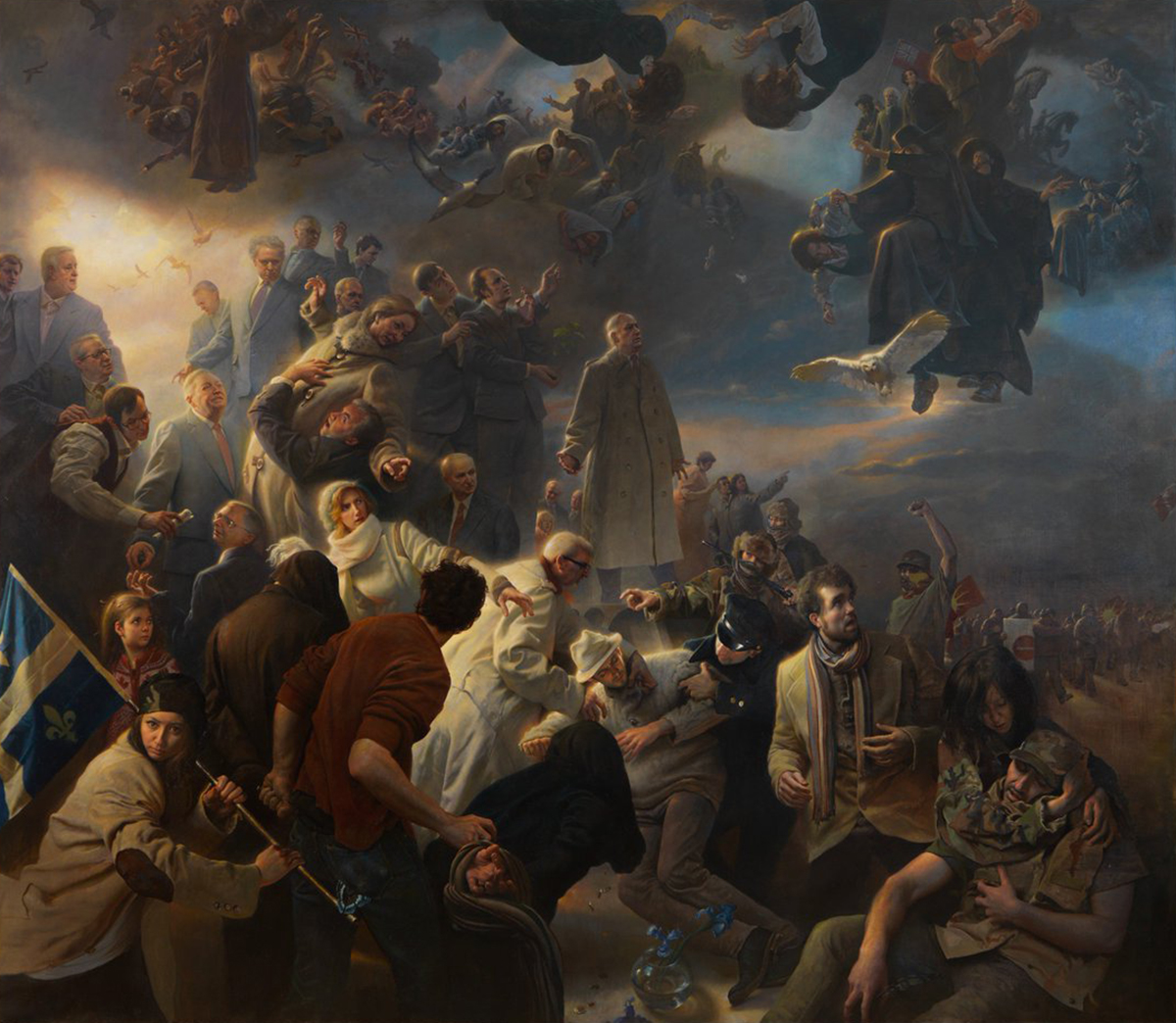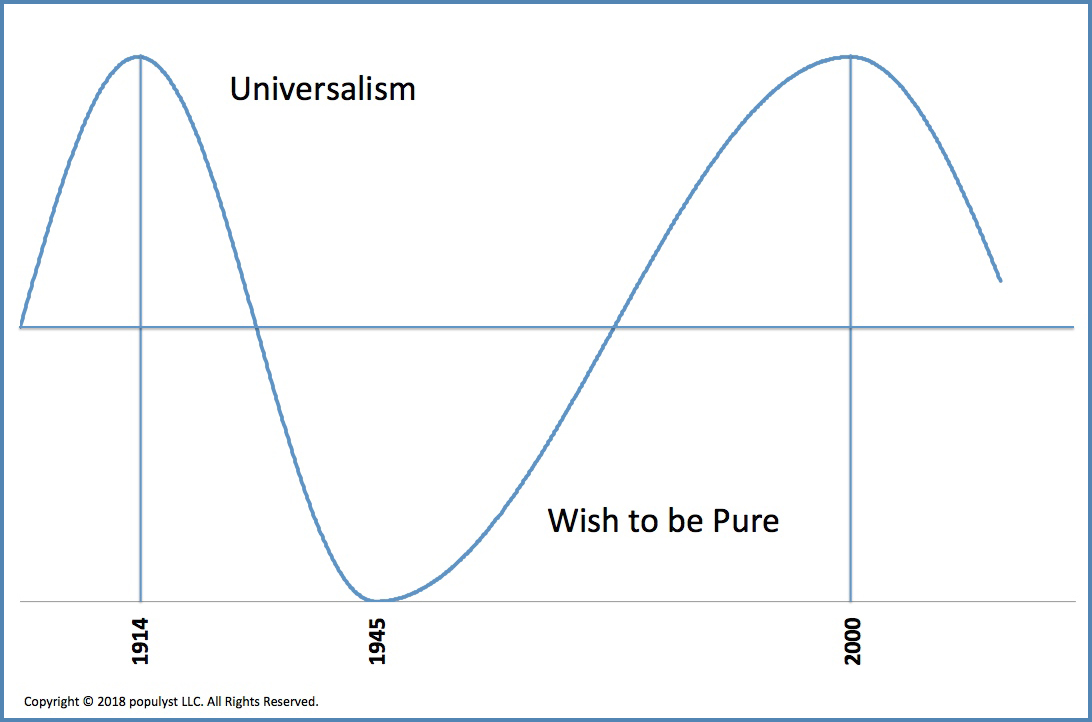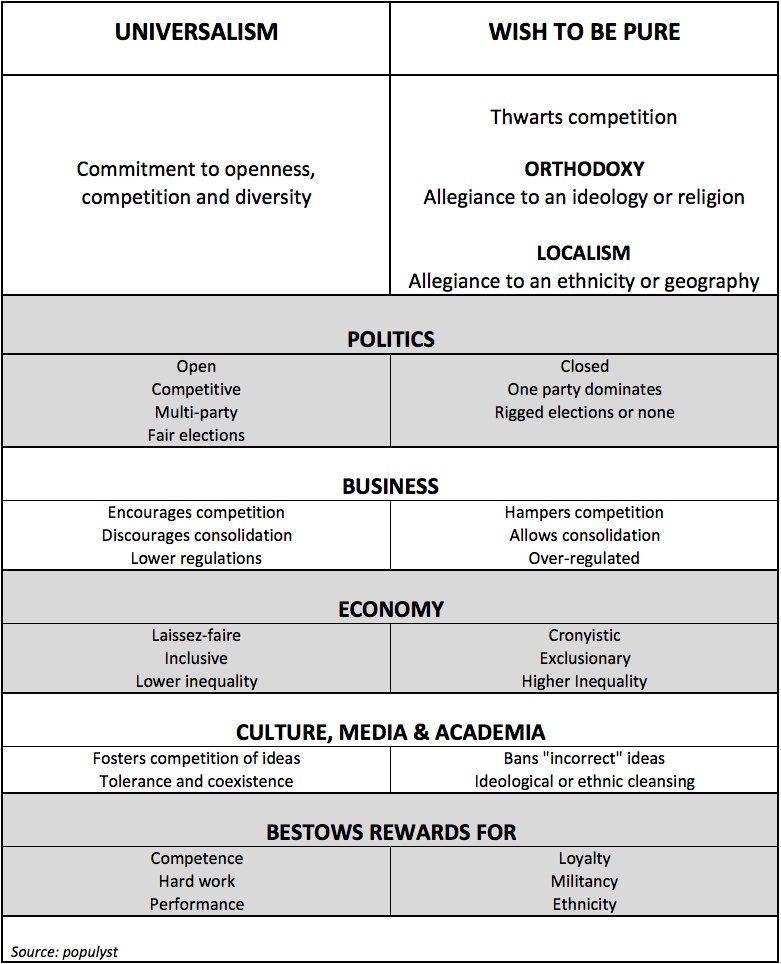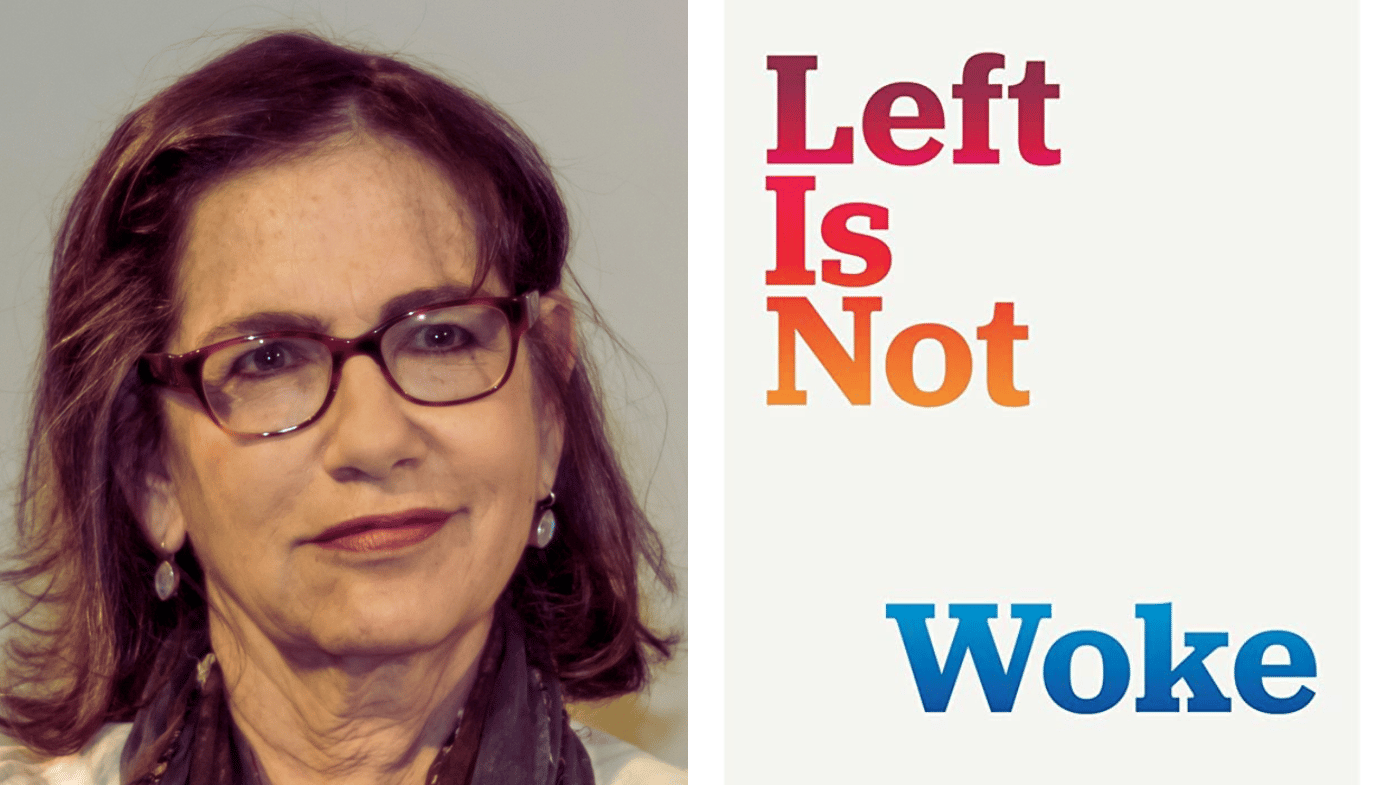History
Purity or Universalism?
The main problem with the quest for purity is that it is fine in one’s own home or church but it becomes a problem in the public square, which—by virtue of being inherently diverse and competitive—is configured to resist the wish to be pure.

A few days after his recent passing, the Manhattan Institute reposted a speech by V. S. Naipaul from October 1990. The title, “Our Universal Civilization,” captured the triumphal and optimistic spirit of that moment, nearly one year after the fall of the Berlin Wall. In order to render this universal civilization in greater relief, Naipaul related the following about his travels in Asia [emphasis added]:
Traveling among non-Arab Muslims, I found myself among a colonized people who had been stripped by their faith of all that expanding intellectual life, all the varied life of the mind and senses, the expanding cultural and historical knowledge of the world, that I had been growing into on the other side of the world. I was among people whose identity was more or less contained in the faith. I was among people who wished to be pure.
If we had read this paragraph without knowing its date or the subjects’ actual geography, religion, and history (in this case colonized non-Arab Muslims), we might have surmised that Naipaul was talking about parts of America and Europe that he had perhaps visited in the months preceding his death. “People whose identity was more or less contained in the faith” could easily apply to certain constituencies in the West today, the more so if one allows some latitude in the definition of the word ‘faith.’
Nearly 30 years after he delivered this speech, Naipaul’s assumption that this was primarily a religious or Muslim phenomenon seems quaint. Today, we can see that the wish to be pure has emerged in opposition to universalism in many parts of the world including our own. We can no longer claim that it is just Islam that has grown resistant to the universal civilization envisioned by the West in the late twentieth century. Some groups within the West itself have also rediscovered their own craving for purity.
In his 1996 book, The Clash of Civilizations, Samuel Huntington was already dismissive of Naipaul’s idea of a universal civilization:
The idea of a universal civilization finds little support in other civilizations. The non-Wests see as Western what the West sees as universal. What Westerners herald as benign global integration, such as the proliferation of worldwide media, non-Westerners denounce as nefarious Western imperialism.
Here too, at the end of this excerpt, we find a connection to those in the contemporary West who similarly denounce global integration and worldwide media. Ironically, today’s reality devalues Huntington’s clash of civilizations to little more than a willful construct, a mirage, and an inadequate template. The clash today is not between different civilizations but within each civilization, not between countries but within each country. It is not across borders, but across other fault lines within those borders.

Looking all the way back to 1900, we can theorize that universalism and the wish to be pure have each been dominant at different periods, especially in Europe. Before WW1, there was a period of universalism and globalization brought about by faster communications (the telegraph) and faster transportation (the steam engine, the train, the automobile). Then there was a 30 year period where the wish to be pure gained more and more adherents, some for ideological purity (communism), others for racial or nationalist purity (nazism, Francoism).
After the widespread destruction of WW2, the United States was so dominant that it could impose its view of universalism on the world, in Europe and Japan first, then on the former Soviet bloc after 1990, and ultimately via trade on China and other emerging markets too. This surge in universalism ended in the decade of the 2000s, with disillusion after the Nasdaq crash of 2000-02, the attacks of 9/11, the Afghan and Iraqi wars, and the 2008 financial crisis. As a consequence of these events, we are now dealing with a turn in the historic trend away from universalism towards the wish to be pure in many parts of the world. As was the case 100 years ago, this wish has two main arms—one for ideological orthodoxy and the other for ethnicity and nationalism, something we may call localism.

Orthodoxy and Localism
The world’s main competing social and political blocs can therefore no longer be understood as a historic confrontation between East and West, North and South, Socialism and Capitalism, or Christendom and Islam. Although some politicians remain wedded to them, these models do a poor job explaining the present state of play. The main competition now is between universalism and the wish to be pure. Purity manifests itself in thought or ideological orthodoxy—polarized media such as Fox and MSNBC and college campuses—or as geographic localism, as seen in the resurgence of nationalism. By contrast, universalism is about the competition for ideas (not orthodoxy) and about globalization and diversity (not localism).
The orthodoxy is motivated by a ‘progressive’ belief that society is perfectible and that any backsliding in the ‘wrong’ direction is unacceptable. Adherents to this belief ascribe a righteousness and inevitability to social change usually reserved for scientific discovery. The localism has its roots in disenchantment with globalization, nation building, mass migration, rent-seeking cosmopolitan elites, and international institutions. Its main effect has been to re-energize a nationalism and a populism thought to have died in the West at the time of Naipaul’s speech. As Anne Applebaum remarked in a recent essay about Poland for the Atlantic, “Sooner or later, the losers of the competition were always going to challenge the value of the competition itself.”
The two principal building blocks of universal civilization are globalized competition—not only in goods, but also in ideas—and freer movement of people. But competition creates winners and losers. The winners have often been individuals or groups with a weaker connection to ideology or to geography (say investment bankers who can work as effectively in New York, London, or Hong Kong). By contrast, the losers have typically had a stronger connection to ideology or geography or both and have increasingly sought to capitalize on that connection.
Of course, universal civilization committed many errors of its own that contributed to its fall from favor. Rising inequality and rampant cronyism have played a part in convincing people in many countries that globalization does not share its wealth widely and does not spread its opportunities universally. So, Naipaul was right to identify a “wish to be pure” but he was wrong to believe that it appeared in only a few places that were culturally different from the West. We have it here, on the Left with orthodoxy and on the Right with localism.

Origin of a Wish
But where does this wish to be pure come from? It is a way to change the rules of the game. If you can’t win at game A, switch to game B where your odds may be better. If competitive capitalism doesn’t deliver for you, switch to cronyism or to socialism. If the competition of ideas is a strain and you resent the financial success of the more competent, switch to the cleansing orthodoxy of a party line. If globalism and diversity don’t work for you and you envy the progress of the immigrant or minority, switch to localism and ethnocentric nationalism.
After the spoils of competition have been distributed, those who consider that they got less than their just deserts have an incentive to question why and how somebody deserves something. In their upended logic, if winners have deserved more by going to college, then there is something wrong with college; or if it looks ex-post that it was helpful to some people to be part of a certain ethnic group, then there is something wrong with that group; or if intellectual property (software, media, technology) has delivered more wealth than real property (real estate, extractive industries, gold), then there is something wrong with intellectualism.

There are two main ways of deserving:
- Merit: This is about competitive performance, hard work, and competence. It is the ethos of universalism.
- Faith and Identity: This is about loyalty to God or to the group. It is the ethos of the wish to be pure.
The rewards of merit are largely uncontrollable, especially in a hyper-competitive society. But faith and identity can deliver for people who organize in groups to restrict competition from outsiders.
There is a global trend today of people in many countries looking for a shortcut towards success by reinforcing their identity, through either orthodoxy or localism. This pursuit of purity holds that if a person were truer to his identity, then his mind and body will be cleansed of the toxins that contribute to his misery. If a believer is more religious, his co-religionists and his god will reward his devotion, respectively; if a nationalist is more patriotic, his nation will reward his loyalty; and if a person of a certain gender or race is more representative of his demographic, his community will reward his solidarity.
This mode of thinking is no longer chiefly found in developing countries or god-fearing theocracies. The global wish for purity is nearly everywhere and it is spreading.
Purity for the Many
The main problem with the quest for purity is that it is fine in one’s own home or church but it becomes a problem in the public square, which—by virtue of being inherently diverse and competitive—is configured to resist the wish to be pure. In all but the most homogeneous countries or regions, the desire for purity is difficult to reconcile with competitive politics.
Yet it is very much present in politics today, here and abroad. In the United States, both parties cater to constituents whom they view as having a purer American identity. Both parties try to thwart competition and to reinforce group identity. The battle lines are drawn among the 80 to 90 percent who constitute the middle class and poorer segments of the population. Increasingly, they are called upon to choose between two forms of purity, the more ideological orthodox vision that seeks to equalize outcomes as much as possible in the name of fairness, diversity, and inclusion, or the more traditional localist vision of a mainly white, mainly Christian America that is increasingly challenged by shifting demographics.
Cronyism for the Few
Meanwhile, the wealthier 10 to 20 percent of the population have done a superlative job of taking care of themselves. They speak the language of universalism but are increasingly involved in anti-competitive rent-seeking occupations and hoarding the American dream for themselves and their children. Unlike the rest of the population, they have access to the best education, plum jobs, and huge pools of capital.
Upon closer examination, each proposition of purity is a subterfuge to harness the backing of the multitude while a small percentage of the population consolidates ever more power and wealth. This may sound like cynicism at first but this template of cronyism for the few, purity for the manyfits the data in most countries in the world. The main thing that the cronies at the top have in common with those seeking purity is that they both want to limit competition in one form or another.
In a recent article entitled “America Is Moving Toward an Oligarchical Socialism,” Joel Kotkin provides a good example of this phenomenon:
Particularly since Donald Trump’s election, the leaders of corporate America—especially in tech and finance—have merged with the Democrats. They appeal to progressives by advocating politically correct views on immigration, gender rights, and climate change, while muzzling conservatives both inside and outside their companies.
If we want to be honest, socialism, capitalism, theocracy, and nationalism have all shown themselves to be flawed. Socialism and its more pernicious extreme, communism, are unattainable notions that cannot accommodate human beings’ natural competitive drive for more personal comfort and efficiency. Capitalism has had its periodic moments on center stage but its Achilles’ heel is that it has nearly always been corrupted by cronyism.
The wish to be pure exemplified by ideology, tribalism, nationalism, and religious orthodoxy promises a better tomorrow but never delivers except for the leading cronyistic elites. It promotes at great cost an illusion of purity that eventually wears thin except for the more ascetic members of society. By then, it is too late as the few at the top now command all the levers of money and power and have no qualms decapitating and ruthlessly suppressing any revolt that dares extend its neck.
This is the story of the present. Nearly all constituencies are working to limit competition, the lifeblood of universalism. In an increasing number of countries, a small entourage of cronies are trying to hoard wealth and power while at the same time selling a sterile purity to the people. Universalism and competition will be on their back legs for as long as the people fall for this destructive manipulation.






